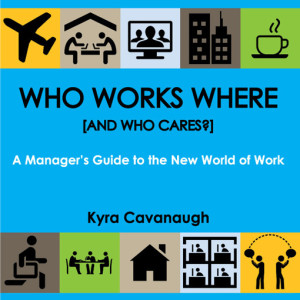Welcome to our Fall 2014 Great Ideas @ Work Newsletter! From our national partners to our local colleagues, there is lots to share and learn about workplace flexibility right now. Enjoy — and pass on to your friends and co-workers!
- When Work Works Award Celebration | Together we honored this year’s 18 winners, shared inspiring stories, and built momentum in our community.
- Awesome Articles | It’s not just for mothers: Men and flexibility, Mature workers and flexibility, Death and flexibility, and more
- Books We Recommend | Who Works Where [And Who Cares?]
- Ask Family Forward | Doing right by pregnant employees
- We’re on Linked In | Join our group for conversation with other flexible employers
1. WHEN WORK WORKS AWARD CELEBRATION
 On November 20th, we gathered to honor this year’s Oregon winners of the national When Work Works workplace flexibility award (formerly called the Sloan Award for Workplace Effectiveness and Flexibility). This year’s 18 winners included 11 former winners and seven new ones. At the event, representatives of five winning workplaces shared their personal experiences about creating and working in flexible environments and how it impacts the rest of their lives and their workplaces.
On November 20th, we gathered to honor this year’s Oregon winners of the national When Work Works workplace flexibility award (formerly called the Sloan Award for Workplace Effectiveness and Flexibility). This year’s 18 winners included 11 former winners and seven new ones. At the event, representatives of five winning workplaces shared their personal experiences about creating and working in flexible environments and how it impacts the rest of their lives and their workplaces.
The event generated a lot of energy around the work-flex movement we’re building here in Oregon – as you’ll see in this great Oregonian article. You can also check out this year’s winners here and you can see see all of the Oregon winners from 2011-2014 by clicking here.
2. AWESOME ARTICLES
Every day, we come across new articles about flexibility and family-friendly policies at work. Too often, work-flex is seen as a mom’s issue. But it’s far, far more than that! Which is why we’ve picked out a sampling of articles that show the breadth and range of flexibility – for all employees. Check out these articles on how flexibility impacts men, mature workers, and the role of death in our communities.
- For Men, Informal “Flex” Arrangements Work Best. This article reflects on the findings of the How Men Flex study. Click here to read more.
- The Benefits of Flexible Work for Mature Workers and Their Employers. Another population that flexible working engages: older workers. See the article here.
- The Case for Work-Death Balance in Fast Company. Intriguing title, huh? Check it out here.
3. BOOKS WE RECOMMEND | WHO WORKS WHERE [and who cares?]
An organization we like that focuses on life-work fit, Life Meets Work, recently published a book about managing our increasingly mobile and dispersed workforce for performance outcomes. Here’s what you’ll learn:
Managers: It’s time to build your skills for the future of work. Work is changing, and it is no longer reasonable or appropriate to “manage by walking around.” You can’t use face time to monitor whether people are working; you need the skills to manage for performance. Your future teams will be increasingly mobile and dispersed. Successful managers will know how to get the best from these teams, how to maintain engagement, and how to build collaboration…even when people don’t see each other face-to-face everyday.
to build your skills for the future of work. Work is changing, and it is no longer reasonable or appropriate to “manage by walking around.” You can’t use face time to monitor whether people are working; you need the skills to manage for performance. Your future teams will be increasingly mobile and dispersed. Successful managers will know how to get the best from these teams, how to maintain engagement, and how to build collaboration…even when people don’t see each other face-to-face everyday.
Who Works Where [and Who Cares?] will show you exactly how to do that.
5 | ASK FAMILY FORWARD | Understanding Pregnancy in the Workplace
 Ask Family Forward is a space where Family Forward will provide thoughtful, researched answers to some of your most pressing questions about workplace flexibility. This edition’s topic is pregnancy discrimination and accommodation. If you have a question you would like us to address in a future newsletter, please email your question to Sharon at sharon@familyforward.org.
Ask Family Forward is a space where Family Forward will provide thoughtful, researched answers to some of your most pressing questions about workplace flexibility. This edition’s topic is pregnancy discrimination and accommodation. If you have a question you would like us to address in a future newsletter, please email your question to Sharon at sharon@familyforward.org.
Now, for our current topic…
What are the current laws around pregnancy and work?
With the Young v. UPS pregnancy accommodation case before the U.S. Supreme Court and a real-but-incredibly-bizarre local case (read about it here) where a pregnant employee was fired for urinating too often, it’s a perfect time to clarify current laws around pregnancy discrimination and accommodation – and make sure that your policies and practices are working well for the women you employ, even if that means doing better than the floor the law sets for you.
Understanding the laws:
There are two basic protections that pregnant women deserve: freedom from discrimination and on-the-job accommodation when needed. Discrimination is outlawed in both general sex discrimination laws and, for employers of a certain size, under the federal Pregnancy Discrimination Act. Accommodation is covered as a “temporary disability” under federal and state disability laws.
Federal laws only apply to Oregon employers with 15+ employees:
There are two laws at the federal level that protect pregnant women: the American with Disabilities Act (ADA) and the Pregnancy Discrimination Act (PDA), both of which apply to employers with 15 or more employees. The PDA was enacted in 1978 as an amendment to Title VII of the Civil Rights Act of 1964 (which didn’t include pregnant women specifically as a protected class). The basic PDA requirements are:
- An employer may not discriminate against an employee on the basis of pregnancy, childbirth, or related medical conditions; and
- Women affected by pregnancy, childbirth, or related medical conditions must be treated the same as other persons not so affected but similar in their ability or inability to work.
Click here to read more about the Pregnancy Discrimination Act requirements.
Oregon law applies to more employers
Oregon does not (yet) have separate laws protecting pregnant women from discrimination or requiring reasonable accommodations (as some other states and cities do). However, there are two related laws in Oregon that apply to pregnant workers and women more broadly: 1) sex discrimination – which includes pregnancy – for all employers, and 2) disability accommodations for employers with six or more employees.
- In our state law, pregnancy discrimination is considered sex discrimination, which is part of the state’s unlawful discrimination statute (the Oregon Fair Employment Practice Act at OR659A) and applies to all employers. Pregnancy accommodation is not required as part of discrimination law.
- Pregnancy accommodation requirements are found in Oregon’s disability law and apply to employers with six or more employees. This covers more employers than the federal ADA, which only applies to employers with 15 or more employees. Like federal law, pregnancy accommodations can be required under state disability law when the conditions limit one or more “major life activities.” A list of major life activities can be found in ORS 659A.104(1)(A) and includes activities such as walking, standing, lifting, bending, sitting, operations of bodily functions, etc. Employers covered by both state and federal laws (all those with 15 or more employees) must apply the standard most beneficial to the employee.
Please note: We are not employment lawyers. Please check with yours and the Oregon Bureau of Labor and Industry (BOLI) for official guidance.
6 | JOIN US ON LINKED IN
Family Forward is on Linked In, and our group is a great place to foster conversation with each other about flexibility. Looking for articles, research, news, opinions? Join our group! We’re right here.
See you there!


